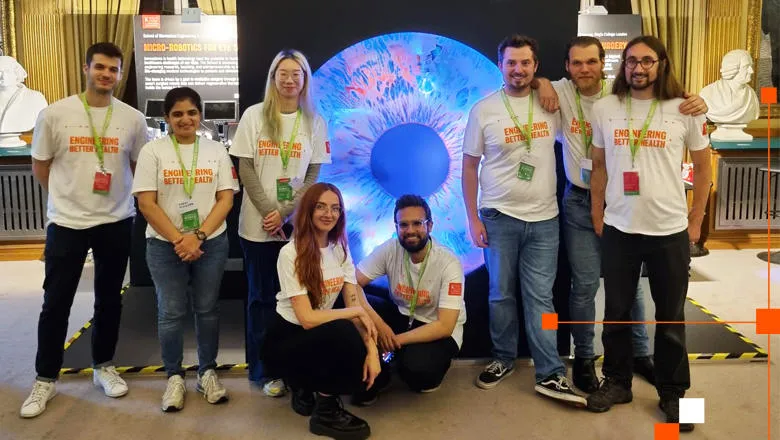We are very proud to be a part of the Royal Society Summer Science Exhibition. This is a truly premier event, with bespoke activities created specifically for all ages of the attendees. We will be presenting our research on micro-robotics for eye surgery, engaging with our audiences through virtual reality interfaces, hands on activities, and by bringing our robotic equipment to create the operating room of the future right on the spot.
Christos Bergeles, Reader, Department of Surgical & Interventional Engineering
05 July 2023
Micro-robots meet the public at the Royal Society's Summer Science Exhibition 2023
The School of Biomedical Engineering & Imaging Sciences showcases how micro-robotics can be used for eye surgery and the delivery of regenerative therapies.

Visitors to the Royal Society’s Summer Science Exhibition, 4th – 9th July, will be able to learn how new micro-surgical robotic systems are being developed that can operate within the human retina and other areas deep within the human body.
The exhibit, ‘Super-human capabilities in tiny spaces: micro-surgical robotics for eye surgery’ aims to showcase how we can improve surgical performance by developing smart robotic instrumentation.
Audiences will be shown how micro-robotics could be used for cutting-edge procedures including delivering regenerative STEM-cell therapies to restore sight to people with conditions such as age related macular degeneration.
Continuum robots move like an elephant’s trunk, can flex and alter their shape to avoid critical anatomical regions, and can control the position and orientation of their tip to mimic the dexterity of the human hand. These robots can reach the bottom part of the eye where they can transplant retinal cells to replace damaged ones, ultimately improving the dexterity of the surgeon.
As the robotic micro-surgeons need to operate within the confined space of the eye, one needs to think beyond conventional articulated robots that require large transmission systems and bulky interfaces. In such spaces, continuum robots offer the best compromise between size and dexterity.
Public interest in understanding the scientific research that underpins modern healthcare has never been greater, and opportunities such as this play a vital part in sharing our School’s mission to engineer better health and improve patient outcomes. Flexible micro-robots can provide increased dexterity, better visualisation, superhuman sensing capabilities and enable surgeons to carry out challenging and even previously impossible interventions.
Professor Sebastien Ourselin FREng FMedSci, Head of School, School of Biomedical Engineering & Imaging Sciences
The project is the latest outing for the School’s ongoing Hospital of the Future themed series of public experiences and exhibits, following on from the success of last year’s popular feature at New Scientist Live 2022.
The Royal Society’s annual Summer Science Exhibition is a free interactive experience featuring exhibits, talks and activities to showcase the latest advances in science and technology.


